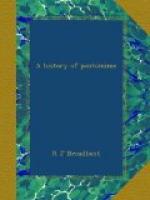Hence it is that no scholars in Europe but the most learned Italians, smit by the national genius, could have devoted their vigils to narrate the evolutions of Pantomime, to compile the annals of Harlequin, to unroll the genealogy of Punch, and to discover even the most secret anecdotes of the obscurer branches of that grotesque family, amidst their changeful fortunes, during a period of two thousand years. Nor is this all; princes have ranked them among the Rosciuses; and Harlequins and Scaramouches have been ennobled. Even Harlequins themselves have written elaborate treatises on the almost insurmountable difficulties of their art. I despair to convey the sympathy they have inspired me with to my reader; but every Tramontane genius must be informed, that of what he has never seen, he must rest content to be told.
Of the ancient Italian troop we have retained three or four of the characters, while their origin has nearly escaped our recollection; but of the burlesque comedy, the extempore dialogue, the humorous fable, and its peculiar species of comic acting, all has vanished.
Many of the popular pastimes of the Romans unquestionably survived their dominion, for the people will amuse themselves, though their masters may be conquered; and tradition has never proved more faithful than in preserving popular sports. Many of the games of our children were played by Roman boys; the mountebanks, with the dancers and tumblers on their moveable stages, still in our fairs, are Roman; the disorders of the Bacchanalia, Italy appears to imitate in her Carnivals. Among these Roman diversions certain comic characters have been transmitted to us, along with some of their characteristics, and their dresses. The speaking Pantomimes and Extemporal Comedies which have delighted the Italians for many centuries, are from this ancient source.




